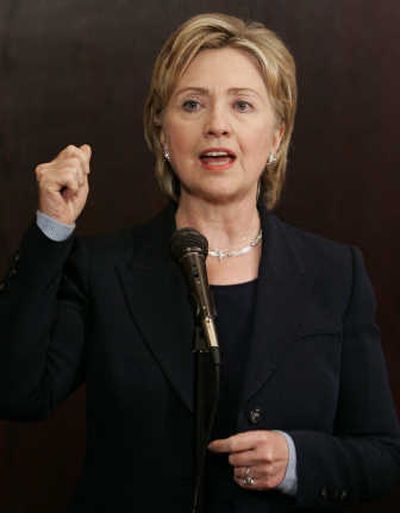Clinton wants push in sciences

WASHINGTON – Sen. Hillary Clinton vowed Thursday to end what she called President Bush’s “war on science” by lifting federal limits on embryonic stem cell research and investing billions in scientific research and development.
Clinton, a leading candidate for the Democratic presidential nomination, also criticized the Bush administration for “ignoring or manipulating science” to serve narrow political interests, with the result that “our economic competitors get an edge in the global economy.”
In a speech to the Carnegie Institution for Science, Clinton said she would launch a $50 billion fund to research alternative energy, hopes to double the $28 billion budget of the National Institutes of Health over 10 years, and would order political appointees to ensure the integrity of federal scientific inquiry.
Clinton’s speech was tied to the 50th anniversary of the Soviet Union’s launch of the Sputnik satellite – an event that galvanized American interest in science as the nation realized it was losing the space race.
“What America achieved after Sputnik is a symbol of what America can do now as we confront a new global economy, new environmental challenges and the promise of new discoveries in medicine,” Clinton said. “America led in the 20th century – and with new policies and a renewed commitment to scientific integrity and innovation, America is ready to lead in the 21st.”
By promising to reverse Bush’s 2001 order limiting federal funding of embryonic stem cell research, Clinton latched onto an issue that has broad bipartisan support outside the Republican Party’s base of religious conservatives. She called Bush’s position a “ban on hope.”
Her promise to spend billions on alternative energy research comes as more Americans are expressing concern about climate change – and the price of oil. To pay for her energy proposals, Clinton said she’d close tax subsidies and loopholes for oil companies.
Highlighting the Bush administration’s stance on science could help Clinton win over disaffected independents and moderate Republicans. At various times, the administration has been accused of whitewashing reports on climate change. It also has suggested on federal Web sites links between abortion and breast cancer, an assertion that scientists question.
“For six and a half years, it’s been open season on open inquiry,” Clinton said.